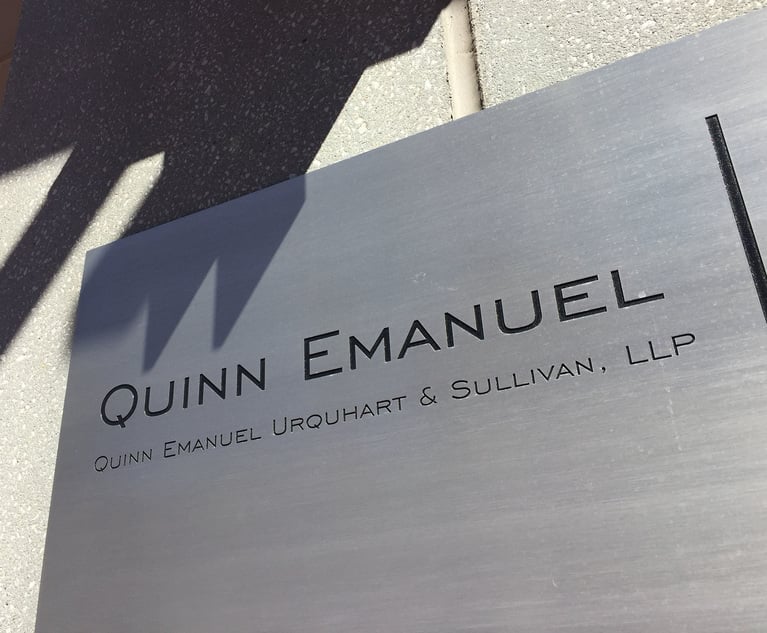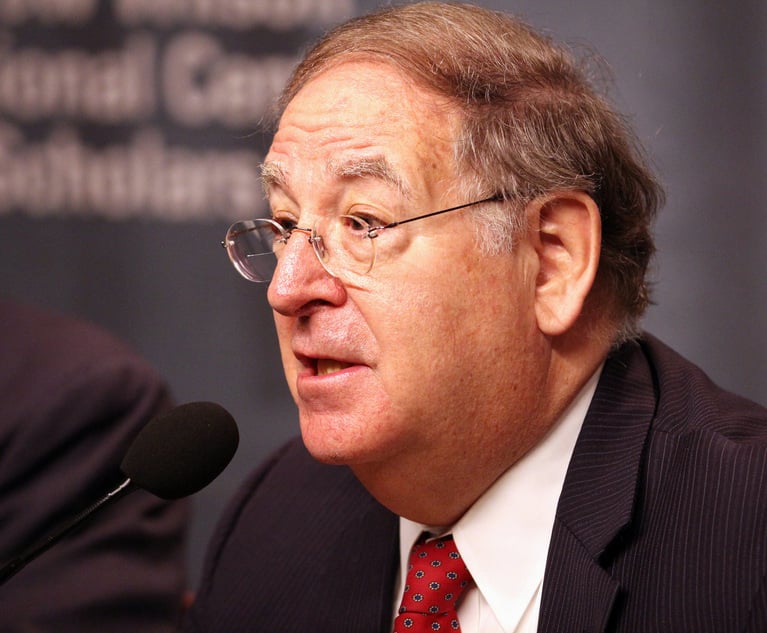Objector Should Get Fees in Southwest Airlines Drink Voucher Settlement, Appeals Court Says
A federal appeals court sided with an objector who sought fees in a settlement over drink vouchers on Southwest Airlines—but issued a stern warning to the lawyers to end the case.
August 03, 2018 at 04:53 PM
5 minute read
 Photo: Dylan Ashe via Wikimedia Commons
Photo: Dylan Ashe via Wikimedia Commons
A federal appeals court sided with an objector who sought fees in a settlement over drink vouchers on Southwest Airlines—but issued a stern warning to the lawyers to end the case.
The U.S. Court of Appeals for the Seventh Circuit reversed a decision that had rejected fees to Ted Frank, of the Competitive Enterprise Institute's Center for Class Action Fairness, who represented an objector in the settlement.
“Objectors who add value to a class settlement may be compensated for their efforts,” wrote Circuit Judge David Hamilton in Thursday's opinion. No matter how Frank's fees are calculated, he wrote, “this is not a case where an objector ran up a tab with minimal value added.”
Hamilton knows the case well: He wrote a 2015 opinion that cut $15,000 from the $1.65 million fees awarded to plaintiffs attorney Joseph Siprut and reversed a $15,000 incentive payment to attorney Adam Levitt, who was the plaintiff—both for failing to disclose they had served as co-counsel in an unrelated case. Despite that order, Siprut, founding partner of Siprut P.C. in Chicago, made an “astonishing request for supplemental fees” of $1.36 million, Hamilton wrote on Thursday, while Frank agreed to stop challenging the settlement in exchange for triple the number of vouchers for class members.
“Unless the parties expressly agree otherwise, settlement agreements should not be read to bar attorney fees for objectors who have added genuine value,” Hamilton wrote. “It would be inequitable for Markow's lawyer to receive nothing despite negotiating, in exchange for dropping the second appeal, a tripling of relief for the class and a significant cut to Siprut's fees,” referring to Frank's client, Gregory Markow.
But Siprut still would get more fees than he originally sought—a fact that Hamilton called “troubling.” “It is time to end this litigation,” he wrote.
Siprut and Frank did not respond to requests for comment. Southwest Airlines Co. attorney Eli Kay-Oliphant, of Massey & Gail in Chicago, also did not respond to a request for comment.
Levitt, of Chicago's DiCello Levitt & Casey, sued in 2011, when he was then at Grant & Eisenhofer, after Southwest stopped honoring coupons good for $5 alcoholic drinks that had no expiration dates. He brought the class action as the plaintiff on behalf of more than 2 million passengers who purchased business-select tickets.
Plaintiffs lawyers were to get $3 million in fees based on their initial agreement with Southwest. But U.S. District Judge Matthew Kennelly of the Northern District of Illinois approved $1.65 million. After the Seventh Circuit's 2015 ruling, which affirmed the settlement, Siprut sought additional fees.
In a 2016 ruling, Kennelly chastised the fee request as “grossly excessive” and based on vague billing records.
“One is left with the overall impression that the fee position boils down to this: Some of the originally hoped-for $3,000,000 that Southwest agreed not to oppose is still on the table, and plaintiffs' counsel are trying to find a way to get the rest of it.”
(In Thursday's order, Hamilton noted this remark, stating: “We find it difficult to reconcile Siprut's rapacious requests for fees in the district court with our decision in the prior appeal that reduced its already generous fee award as a modest penalty for failing to disclose a potential conflict of interest.)
But Kennelly awarded Siprut $455,000 more—a move that prompted Frank to ask the judge to reconsider. Kennelly granted Frank's motion, but only to send new notices to the class on the increased fee request. Frank appealed to the Seventh Circuit.
The case touched on a key criticism about objector lawyers: Their practice of dropping appeals that challenged class action settlements in exchange for fee payments. So-called “objector blackmail,” usually handled through out-of-court side deals, has become such a problem that the U.S. Judicial Conference's Committee on Rules of Practice and Procedure published proposed amendments to force court approval of such payouts.
But Frank has insisted that he doesn't accept such payouts and, in a separate case before the Seventh Circuit, won a June 26 ruling that would allow him to probe whether lawyers for three other objectors did.
In the Southwest case, Frank cut a deal to drop his appeal in exchange for Siprut cutting his additional fees in half and Southwest tripling the number of vouchers to the class. Months later, Frank filed a motion for $80,000 in fees.
Kennelly held an evidentiary hearing to determine exactly what lawyers discussed in that deal. On Nov. 13, he rejected Frank's fee request because, if granted, it would unravel that deal in which Siprut understood that he would get $200,000 in supplemental fees. Having to pay Frank his fees would lower Siprut's own compensation to $120,000, the judge wrote.
The Seventh Circuit called Frank's “roundabout” way of asking for fees “problematic” since it raised the potential that an objector could “sandbag the settlement by requesting fees later.”
But Frank's fees were never discussed in either the underlying settlement or the agreement he negotiated. The panel disagreed with Siprut that Frank had waived his right to fees.
“Markow's lawyer said only that he did not seek fees as part of the discussions regarding the dismissal of the second appeal,” Hamilton wrote. “He did not say that he never intended to seek fees.”
This content has been archived. It is available through our partners, LexisNexis® and Bloomberg Law.
To view this content, please continue to their sites.
Not a Lexis Subscriber?
Subscribe Now
Not a Bloomberg Law Subscriber?
Subscribe Now
NOT FOR REPRINT
© 2025 ALM Global, LLC, All Rights Reserved. Request academic re-use from www.copyright.com. All other uses, submit a request to [email protected]. For more information visit Asset & Logo Licensing.
You Might Like
View All
Quinn Emanuel Files Countersuit Against DOJ in Row Over Premerger Reporting
3 minute read
'Thoughtful Jurist': Maryland US District Senior Judge Messitte Dies After Short Illness
4 minute read
'Religious Discrimination'?: 4th Circuit Revives Challenge to Employer Vaccine Mandate
2 minute read
4th Circuit Revives Racial Harassment Lawsuit Against North Carolina School District
3 minute readTrending Stories
Who Got The Work
J. Brugh Lower of Gibbons has entered an appearance for industrial equipment supplier Devco Corporation in a pending trademark infringement lawsuit. The suit, accusing the defendant of selling knock-off Graco products, was filed Dec. 18 in New Jersey District Court by Rivkin Radler on behalf of Graco Inc. and Graco Minnesota. The case, assigned to U.S. District Judge Zahid N. Quraishi, is 3:24-cv-11294, Graco Inc. et al v. Devco Corporation.
Who Got The Work
Rebecca Maller-Stein and Kent A. Yalowitz of Arnold & Porter Kaye Scholer have entered their appearances for Hanaco Venture Capital and its executives, Lior Prosor and David Frankel, in a pending securities lawsuit. The action, filed on Dec. 24 in New York Southern District Court by Zell, Aron & Co. on behalf of Goldeneye Advisors, accuses the defendants of negligently and fraudulently managing the plaintiff's $1 million investment. The case, assigned to U.S. District Judge Vernon S. Broderick, is 1:24-cv-09918, Goldeneye Advisors, LLC v. Hanaco Venture Capital, Ltd. et al.
Who Got The Work
Attorneys from A&O Shearman has stepped in as defense counsel for Toronto-Dominion Bank and other defendants in a pending securities class action. The suit, filed Dec. 11 in New York Southern District Court by Bleichmar Fonti & Auld, accuses the defendants of concealing the bank's 'pervasive' deficiencies in regards to its compliance with the Bank Secrecy Act and the quality of its anti-money laundering controls. The case, assigned to U.S. District Judge Arun Subramanian, is 1:24-cv-09445, Gonzalez v. The Toronto-Dominion Bank et al.
Who Got The Work
Crown Castle International, a Pennsylvania company providing shared communications infrastructure, has turned to Luke D. Wolf of Gordon Rees Scully Mansukhani to fend off a pending breach-of-contract lawsuit. The court action, filed Nov. 25 in Michigan Eastern District Court by Hooper Hathaway PC on behalf of The Town Residences LLC, accuses Crown Castle of failing to transfer approximately $30,000 in utility payments from T-Mobile in breach of a roof-top lease and assignment agreement. The case, assigned to U.S. District Judge Susan K. Declercq, is 2:24-cv-13131, The Town Residences LLC v. T-Mobile US, Inc. et al.
Who Got The Work
Wilfred P. Coronato and Daniel M. Schwartz of McCarter & English have stepped in as defense counsel to Electrolux Home Products Inc. in a pending product liability lawsuit. The court action, filed Nov. 26 in New York Eastern District Court by Poulos Lopiccolo PC and Nagel Rice LLP on behalf of David Stern, alleges that the defendant's refrigerators’ drawers and shelving repeatedly break and fall apart within months after purchase. The case, assigned to U.S. District Judge Joan M. Azrack, is 2:24-cv-08204, Stern v. Electrolux Home Products, Inc.
Featured Firms
Law Offices of Gary Martin Hays & Associates, P.C.
(470) 294-1674
Law Offices of Mark E. Salomone
(857) 444-6468
Smith & Hassler
(713) 739-1250










